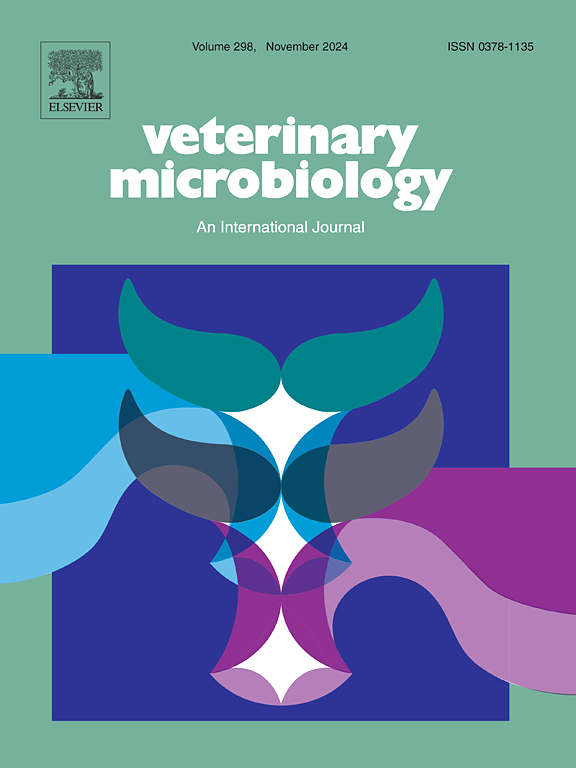The immune responses elicited by six recombinant antigens of Mycoplasma hyopneumoniae in mice
IF 2.4
2区 农林科学
Q3 MICROBIOLOGY
引用次数: 0
Abstract
Mycoplasma hyopneumoniae (M. hyopneumoniae) is the causative agent of swine enzootic pneumonia, resulting in substantial economic losses in global pig farming. Although vaccination is the primary strategy for controlling M. hyopneumoniae infection, current vaccines fall short in preventing transmission of this pathogen or protecting the body from secondary infection. This study aimed to assess the immunogenicity of six recombinant antigens (P97R1, P46, GAPDH, PdhA, DnaK, and EF-Tu) of M. hyopneumoniae through intramuscular immunization in mice. The results showed that the six antigens elicited high levels of serum IgG. Among them, P97R1, P46, PdhA, and DnaK stimulated robust antigen-specific IgA mucosal immune responses. CCK-8 assays revealed that both P97R1 and DnaK significantly increased the proliferation of mononuclear cells from spleen and lung, and DnaK also promoted the proliferation of blood mononuclear cells. Additionally, PdhA induced Th17-type immune response with a high level of IL-17 level in serum. Flow cytometry analysis indicated that P97R1 and PdhA increased the ratio of CD8+/CD4+ T lymphocyte, favoring cytotoxic T lymphocyte (CTL) immune responses. Notably, P97R1 immunization significantly decreased the percentages of CD4+ T cells while increased the percentages of CD8+ T cells. The present findings demonstrate that the candidate antigens P97R1, PdhA, and DnaK of M. hyopneumoniae induce specific humoral and mucosal immunity; P97R1 and DnaK also stimulated intense cellular immunity, and PdhA induced CTL and Th17-type immune responses. In conclusion, P97R1, PdhA, and DnaK emerge as potential candidate antigens for the future development of a more effective subunit vaccine against M. hyopneumoniae.
肺炎支原体的六种重组抗原在小鼠体内引起的免疫反应。
猪肺炎支原体(M. hyopneumoniae)是猪流行性肺炎的病原体,给全球养猪业造成了巨大的经济损失。虽然接种疫苗是控制猪肺炎支原体感染的主要策略,但目前的疫苗在预防该病原体传播或保护机体免受二次感染方面存在不足。本研究旨在通过肌肉注射免疫小鼠来评估六种重组抗原(P97R1、P46、GAPDH、PdhA、DnaK 和 EF-Tu)的免疫原性。结果表明,这六种抗原都能引起高水平的血清 IgG。其中,P97R1、P46、PdhA 和 DnaK 能激发强烈的抗原特异性 IgA 粘膜免疫反应。CCK-8 试验显示,P97R1 和 DnaK 都能显著增加脾脏和肺部单核细胞的增殖,DnaK 还能促进血液单核细胞的增殖。此外,PdhA还能诱导Th17型免疫反应,血清中的IL-17水平较高。流式细胞术分析表明,P97R1 和 PdhA 增加了 CD8+/CD4+ T 淋巴细胞的比例,有利于细胞毒性 T 淋巴细胞(CTL)免疫反应。值得注意的是,P97R1 免疫显著降低了 CD4+ T 细胞的百分比,而提高了 CD8+ T 细胞的百分比。本研究结果表明,肺炎霉菌的候选抗原P97R1、PdhA和DnaK能诱导特异性体液免疫和粘膜免疫;P97R1和DnaK还能刺激强烈的细胞免疫,而PdhA能诱导CTL和Th17型免疫反应。总之,P97R1、PdhA 和 DnaK 是未来开发更有效的肺炎双球菌亚单位疫苗的潜在候选抗原。
本文章由计算机程序翻译,如有差异,请以英文原文为准。
求助全文
约1分钟内获得全文
求助全文
来源期刊

Veterinary microbiology
农林科学-兽医学
CiteScore
5.90
自引率
6.10%
发文量
221
审稿时长
52 days
期刊介绍:
Veterinary Microbiology is concerned with microbial (bacterial, fungal, viral) diseases of domesticated vertebrate animals (livestock, companion animals, fur-bearing animals, game, poultry, fish) that supply food, other useful products or companionship. In addition, Microbial diseases of wild animals living in captivity, or as members of the feral fauna will also be considered if the infections are of interest because of their interrelation with humans (zoonoses) and/or domestic animals. Studies of antimicrobial resistance are also included, provided that the results represent a substantial advance in knowledge. Authors are strongly encouraged to read - prior to submission - the Editorials (''Scope or cope'' and ''Scope or cope II'') published previously in the journal. The Editors reserve the right to suggest submission to another journal for those papers which they feel would be more appropriate for consideration by that journal.
Original research papers of high quality and novelty on aspects of control, host response, molecular biology, pathogenesis, prevention, and treatment of microbial diseases of animals are published. Papers dealing primarily with immunology, epidemiology, molecular biology and antiviral or microbial agents will only be considered if they demonstrate a clear impact on a disease. Papers focusing solely on diagnostic techniques (such as another PCR protocol or ELISA) will not be published - focus should be on a microorganism and not on a particular technique. Papers only reporting microbial sequences, transcriptomics data, or proteomics data will not be considered unless the results represent a substantial advance in knowledge.
Drug trial papers will be considered if they have general application or significance. Papers on the identification of microorganisms will also be considered, but detailed taxonomic studies do not fall within the scope of the journal. Case reports will not be published, unless they have general application or contain novel aspects. Papers of geographically limited interest, which repeat what had been established elsewhere will not be considered. The readership of the journal is global.
 求助内容:
求助内容: 应助结果提醒方式:
应助结果提醒方式:


